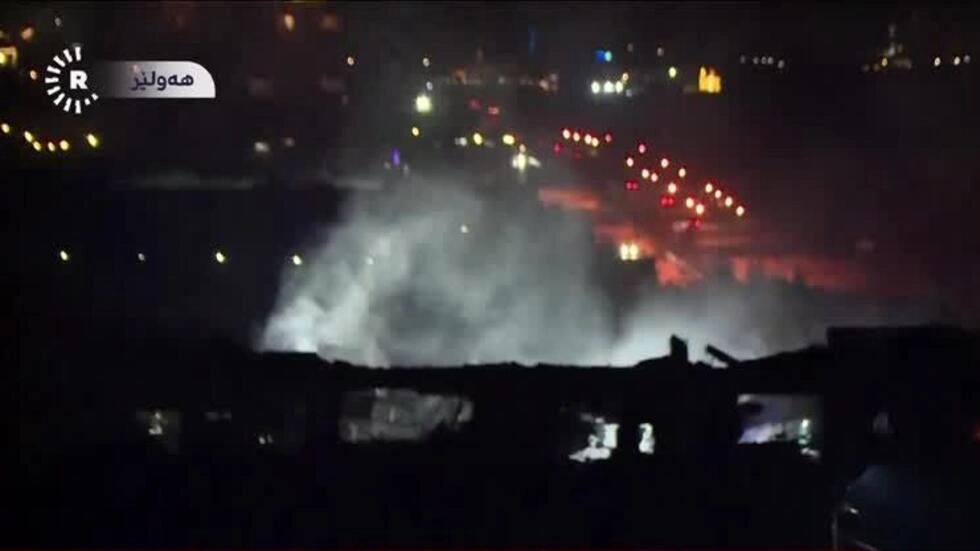Iraq on Tuesday (16) condemned an “aggression” against its sovereignty after Iran fired deadly missiles at the autonomous region of Kurdistan. The Revolutionary Guard claimed that the attack was aimed at destroying “the headquarters of the Zionist regime’s spies (Mossad)”.
(RFI) The Iraqi Foreign Ministry on Tuesday (16) summoned its ambassador to Tehran, Nassir Abdel Mohsen, “for consultations” after the Iranian Revolutionary Guard fired deadly missiles at the autonomous region of Iraqi Kurdistan.
The ambassador was “summoned for consultations in the context of the latest Iranian attacks on Erbil, which resulted in martyrs and wounded,” according to a statement from Iraqi diplomacy in Baghdad.
These attacks, which killed “four civilians” in northern Iraq, according to Kurdish sources, took place in an already tense regional scenario, with the war in the Gaza Strip between Israel and the Palestinian Hamas since October 7, increasing fears of a regional conflagration between the allies of the two sides.
The official Iranian news agency Irna announced late Monday night that the Revolutionary Guard, the Islamic Republic’s ideological army, had carried out an attack on the outskirts of Erbil, the capital of Kurdistan.
The missiles destroyed “a headquarters” from which Israel was believed to be operating. A meeting of anti-Iranian terrorist groups was also targeted.
In Baghdad, the Foreign Ministry condemned “an aggression against the sovereignty of Iraq and the security of its people”. It also summoned the Iranian foreign minister in Baghdad to deliver a “letter of protest”.
The government has ordered the formation of a commission of inquiry to prove “the falsity of the allegations made by those responsible for these reprehensible acts”, according to Iraqi diplomats.
Iraq is already involved in the regional tensions that are shaking the Middle East as a result of the conflict in Gaza.
“Israeli “spies
The government in Baghdad, an important political ally of Tehran but also a partner of the United States, is facing a balancing act as pro-Iranian armed groups carry out a series of attacks against US soldiers and troops from the international anti-jihadist coalition deployed in Iraq and Syria.
Adrienne Watson, spokeswoman for the White House National Security Council, denounced the “inaccurate” attacks, stressing that “no American officials or facilities were targeted”.
France condemned the “inadmissible violations” of Iraqi sovereignty.
On Tuesday morning, Iranian diplomats defended a “precise and targeted operation”, saying that they had “identified” and “targeted” the headquarters of the “criminals (…) using precision weapons”.
During the night, the Revolutionary Guards claimed to have destroyed “the headquarters of the Zionist regime’s spies (Mossad)”, according to the Irna news agency. The site was allegedly used to “carry out espionage operations and plan terrorist actions in the region”.
Although Iraq criminalizes all contact with Israel, politicians and businessmen from Erbil have been accused in the past of maintaining informal political contacts or discreet economic links with that country. But Kurdistan’s official communication denies any connection with Israel.
The attacks killed at least “four civilians” and wounded six, according to the authorities in the autonomous region. Among the dead are real estate tycoon Peshraw Dizayee, his wife and other members of his family, whose house was hit.
According to Irna, this attack was in retaliation for recent attacks, attributed to Israel, which killed several Revolutionary Guard commanders and leaders of the “axis of resistance”, the name given to Tehran’s allies in its fight against Israel.
“Terrorist operations”
On January 2, in the southern suburbs of Beirut, an attack killed Hamas’ number two, Saleh al-Arouri, and six other leaders and executives of the movement.
A few days later, Wissam Tawil, a senior Lebanese Hezbollah military officer, was killed in Lebanon by an attack.
At the end of December, Tehran also accused Israel of assassinating Brigadier General Razi Moussavi in Syria, an important commander of the Qods Force, the elite unit and foreign operations arm of the Guardians.
In addition, the Revolutionary Guards announced on their Sepah News website that they had identified and destroyed, in Syria, “the meeting places of commanders and main elements linked to recent terrorist operations, in particular the Islamic State” (IS).
They explained that this attack had been carried out in “retaliation for recent crimes by terrorist groups”, especially in Kerman (south).
On January 3, a suicide attack was carried out there during a commemorative ceremony near the tomb of General Qasem Soleimani, the architect of Iran’s military operations in the Middle East, who was killed in January 2020 by an American attack in Iraq.
The attack, for which ISIS claimed responsibility, killed around 90 people and injured many others.
(With AFP) *** Translated DEFCONPress FYI Team ***
